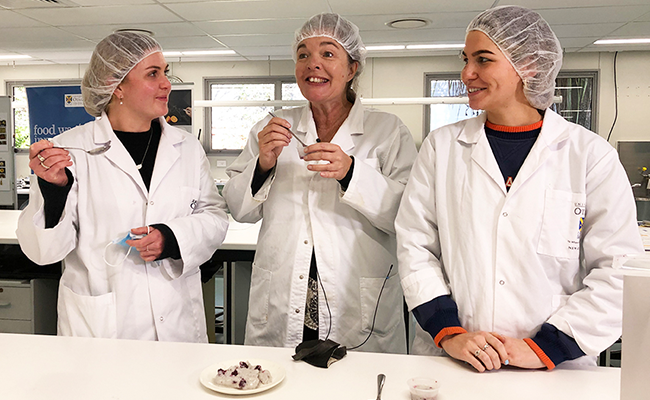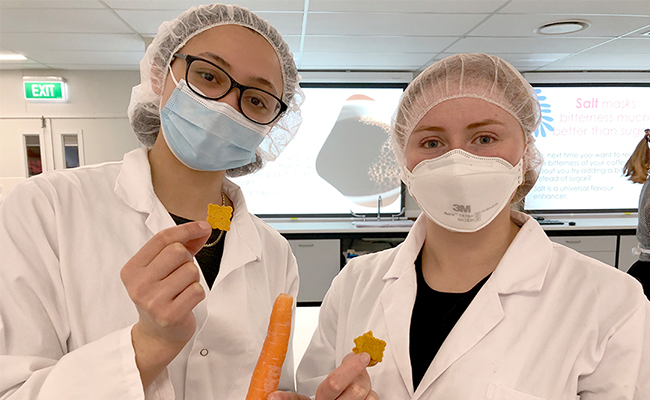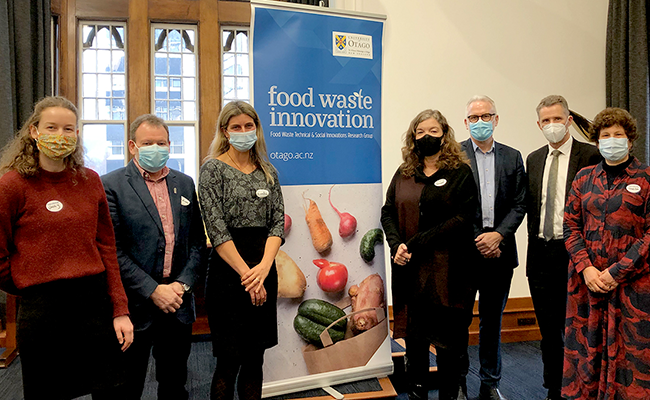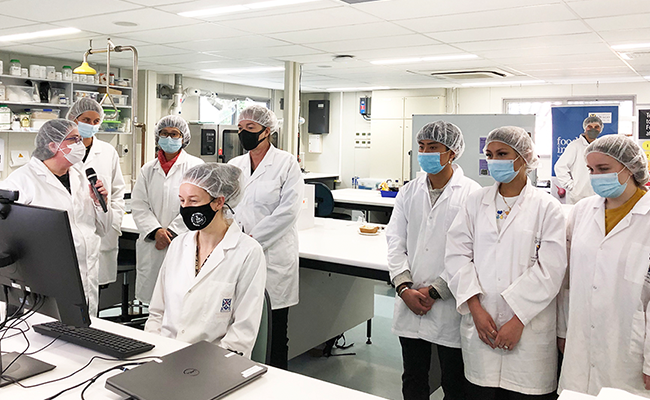Thursday 4 August 2022 3:55pm
 Professor Dame Juliet Gerrard samples the upcycled blueberry plant-based ice cream developed by students Ella McCabe (left) and Georgia McIntyre (right).
Professor Dame Juliet Gerrard samples the upcycled blueberry plant-based ice cream developed by students Ella McCabe (left) and Georgia McIntyre (right).
When the Food Waste Innovation Research Theme launched in 2020, its director and Food Science Associate Professor Miranda Mirosa described its aim as to “tackle the wicked issue of food waste.”
Globally around USD$1 trillion is lost annually on wasted food, a cost that also comes with huge environmental and social impacts, Associate Professor Mirosa says. It’s estimated that food waste accounts for around 10% of human-caused greenhouse gas emissions, which is also why reducing such waste is a priority area for addressing climate-change.
As a primary producing country, food waste is a particular issue for Aotearoa and last week the research theme hosted the Prime Minister’s Chief Science Advisor, Professor Dame Juliet Gerrard FRSNZ HonFRSC, and Emily McCarthy, Senior Research and Policy Analyst from the Office of the Prime Minister’s Chief Science Advisor (OPMCSA).
The pair visited to gather information and hear about research to inform their major 2022 project on food rescue and food waste.
In the two years since the launch, the Food Waste Innovation research group has rapidly become the New Zealand’s primary point of expertise on the subject. The group brings together 24 University of Otago based researchers, 15 postgraduate students, and 12 associate investigators from other institutions across the motu. It has also developed close links with around 20 food waste industry organisations spread across New Zealand.
 Food Science students Lizzie Cunliffe (left) and Molly Goodisson (right) showcase their crackers made from surplus carrots.
Food Science students Lizzie Cunliffe (left) and Molly Goodisson (right) showcase their crackers made from surplus carrots.
The theme’s mahi revolves around identifying the extent of food waste in Aotearoa and providing evidence-based science to help address this challenge such as through reduction strategies, innovative technology, and modifying producer and consumer behaviour.
In 2019 Associate Professor Mirosa also authored a targeted briefing on food waste in New Zealand for the Parliamentary Environmental Committee. This report highlighted that it was important that everybody, including researchers, to deepen their commitment and accelerate their efforts to reduce food waste, and is what provided the impetus for the development of the research theme.
“At a national level, New Zealand has been really lagging behind international efforts in addressing this important environmental, social and economic issue so we are absolutely delighted that politically the wheels are now moving and the OPMCSA is undertaking this significant project,” Associate Professor Mirosa says.
A full two day programme was organised for Dame Juliet and Ms McCarthy, which also included three dedicated workshops each focused on a workstream the OPMCSA has chosen for their overarching food rescue and food waste project.
 Left to right: Emily McCarthy, Professor Phil Bremer, Associate Professor Miranda Mirosa, Professor Dame Juliet Gerrard, Vice-Chancellor Professor David Murdoch, Pro Vice-Chancellor Sciences Professor Richard Barker, Professor Sheila Skeaff
Left to right: Emily McCarthy, Professor Phil Bremer, Associate Professor Miranda Mirosa, Professor Dame Juliet Gerrard, Vice-Chancellor Professor David Murdoch, Pro Vice-Chancellor Sciences Professor Richard Barker, Professor Sheila Skeaff
Dame Juliet reflected that the visit provided the perfect opportunity to be informed and guided by researchers and practitioners committed to the kaupapa. “We were impressed with the way that the research theme tackles food waste through so many lenses,” she says.
“Solutions to this wicked problem will be technical as well as social and need to operate at the grassroots level all the way up to the system level, linking back to consumer preferences and practices, our food systems, and our relationships with kai.”
A public panel session discussing a vision for a future without food waste in Aotearoa was also organised in conjunction with the visit, together with the New Zealand Food Waste Champions 12.3 who travelled to Dunedin for their roundtable meeting.
The Champions represent an organisation of action-orientated food waste experts who are collectively striving to achieve the target of halving food waste by 2030 in line with the United Nation’s Sustainable Development Goal Target 12.3.
Dame Juliet says it was excellent to hear from the Champions and research theme members at this public forum. “Their work and industry connections represented different stages of the food supply chain and different levels of the food recovery hierarchy, underpinning that this problem can’t be solved with just one idea or by just one set of stakeholders.”
The visit by the OPMCSA was also an opportunity to showcase the mahi of the Upcycled Food Laboratory, one area of the Food Waste theme where innovations are taking place.
A number of upcycled food products were available for sampling, ranging from recycled bread, oat pulp crackers, surplus carrot crackers and persimmon fruit strips, as well other innovative projects taking place in the food waste space using eye-tracking technology.
 Emily McCarthy trials the innovative eye-tracking technology research being undertaken by Food Science postdoctoral fellow Dr Erin Young.
Emily McCarthy trials the innovative eye-tracking technology research being undertaken by Food Science postdoctoral fellow Dr Erin Young.
“The students who shared their research in workshops and in the food science lab sparked many ideas that will inform my office’s project – innovative upcycling, understanding the social impact of food rescue, measuring the extent of the problem so it can be managed, and pinning down the drivers of food waste were just some of the many topics they covered with us,” Dame Juliet says.
Associate Professor Mirosa says the capacity to create a transformative change to our food system requires a wide range of stakeholders working collaboratively. “We were delighted to be sharing our group’s research with the OPMCSA and look forward to ongoing collaborations to tackle food waste.”
Dame Juliet says it was fantastic to be hosted by the Food Waste Innovation theme and extended special thanks to Associate Professor Mirosa and theme manager Trixie Croad for the energy and thought that went into the two-day programme.
“The trip gave us so much to absorb, and the insights shared will help us bring together the evidence base in context and shape our recommendations.”
- Kōrero by Guy Frederick
